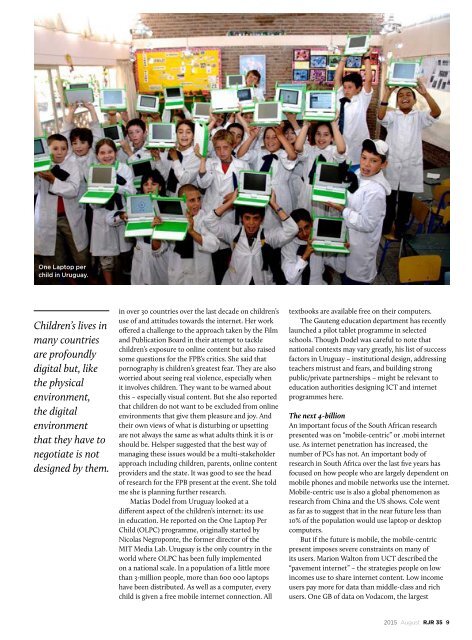Full RJR35
Create successful ePaper yourself
Turn your PDF publications into a flip-book with our unique Google optimized e-Paper software.
network, costs R149. You can buy the same amount<br />
for as little as R7 if you have access to a fixed line<br />
which is generally available only to the better-off.<br />
Walton described how online sharing doesn’t work<br />
for these users. They want to download rather than<br />
use share buttons so they can share face-to-face<br />
with their friends without incurring additional data<br />
costs. It reminded me of a story the filmmaker Lionel<br />
Ngakane once told me of going to the cinema as a<br />
child. He and his friends would save enough pennies<br />
to buy a single ticket and send one of the group into<br />
the cinema. After the movie finished, the boy would<br />
have to re-tell the film, scene by scene, to the others<br />
outside the cinema.<br />
Luci Abrahams reported on the LINK Centre’s<br />
research on low-income and very low-income users.<br />
She highlighted the value these users place on being<br />
able to communicate and the careful rationing they<br />
have to do to use what for them is a very expensive<br />
commodity. Koketso Moeti reported on her work<br />
at amandla.mobi, a social mobilisation tool aimed<br />
at low-income African language speakers, especially<br />
women. She described some of the complex means<br />
they haveput in place to enable the internet and<br />
cash-poor to engage with their campaigns – offering<br />
multiple routes for users from USSD, WhatsApp,<br />
Mxit and SMS to please call me’s and missed calls.<br />
She also raised the issue of the language of the<br />
internet. All their content is translated into four<br />
languages, something few content producers in<br />
South Africa seem to consider, let alone implement.<br />
Our own analysis at the Network Society Project<br />
showed that only 4% of South African adults who<br />
said they could not read and write English easily used<br />
the internet.<br />
The role of the academy<br />
The role of Rhodes and other universities in<br />
founding the South African internet was duly<br />
acknowledged during the week. But there were<br />
also concerns that the academy was not playing a<br />
big enough role in its development today. Nkateko<br />
Nyoka, the head of regulatory affairs at Vodacom,<br />
suggested that universities had now fallen behind<br />
and were no longer producing the research or<br />
innovation, or making the same contribution to<br />
debates about the internet’s future. Adam Habib,<br />
Vice Chancellor of Wits, admitted the university<br />
had been “lethargic” in developing the internet<br />
infrastructure that it required. He committed the<br />
university to a massive upgrade of its technology<br />
and to working with the city to re-invigorate the<br />
ICT infrastructure and innovation in the area<br />
around the university.<br />
What comes next?<br />
The uneven distribution of “the future” is both<br />
obvious and profound. In Sweden, around 9 out<br />
of 10 adults use the internet and connect at fast<br />
speeds. The Chinese World internet Project report<br />
showed that by the end of last year there were an<br />
extraordinary 649-million internet users, almost 48%<br />
of the population. As in Africa, mobile devices and<br />
networks are the backbone of internet growth. The<br />
Russian researchers reported evidence that suggests<br />
the possibility that internet penetration in Russia<br />
could have reached a plateau at just two thirds of the<br />
adult population.<br />
While the US and China are the homes of most of<br />
the largest internet businesses and services, Estonia<br />
produced Skype and Israel, Waze and other global<br />
apps. There is nothing inevitable about how and<br />
when the internet becomes available to all or how<br />
it reorganises economic relationships. To create an<br />
affordable accessible internet in South Africa requires<br />
evidence for policy and planning. To understand how<br />
10 RJR 35 August 2015


